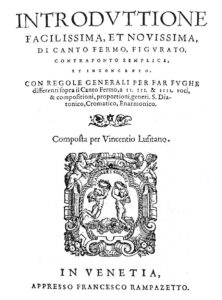
Vicente Lusitano (c. 1520-d. after 1561) was a Portuguese priest, composer, teacher, and music theorist of probable African descent. His Liber primus epigramatum, a book of motets, was dedicated to the son of the Portuguese ambassador to the Holy See. In addition to 24 motets for 4-8 voices, he also wrote a 3-voice madrigal.
Lusitano is primarily remembered as a music theorist, and in particular for his famed debate with Nicolo Vicentino, which resulted in Vicentino’s 1555 L’antica musica ridotta alla moderna prattica. Their disagreement began with an argument about a Regina caeli performed in Rome. Lusitano purportedly claimed the music was purely diatonic, while Vincentino asserted that the chromatic and enharmonic genera were mixed with the diatonic. Lusitano later published his own treatise in 1561, Introduttione felicissima, which was translated into Portuguese by Bernardo da Fonseca and published in Lisbon in 1603. The work discusses the Guidonian hand, hexachords, intervals, psalm intonations, notation, rhythmic proportions, and imitative counterpoint.
Resources
Public Domain Scores and Treatises
Sources
Blackburn, Bonnie J. “Lusitano, Vicente [Lusitanus, Vincentius].” Grove Music Online. 2001.
Schumann, Garrett. “Centuries of Silence: Vicente Lusitano and Classical Music’s Selective Memory.” Van Magazine. 23 April 2020.
Works Featured on Expanding the Music Theory Canon